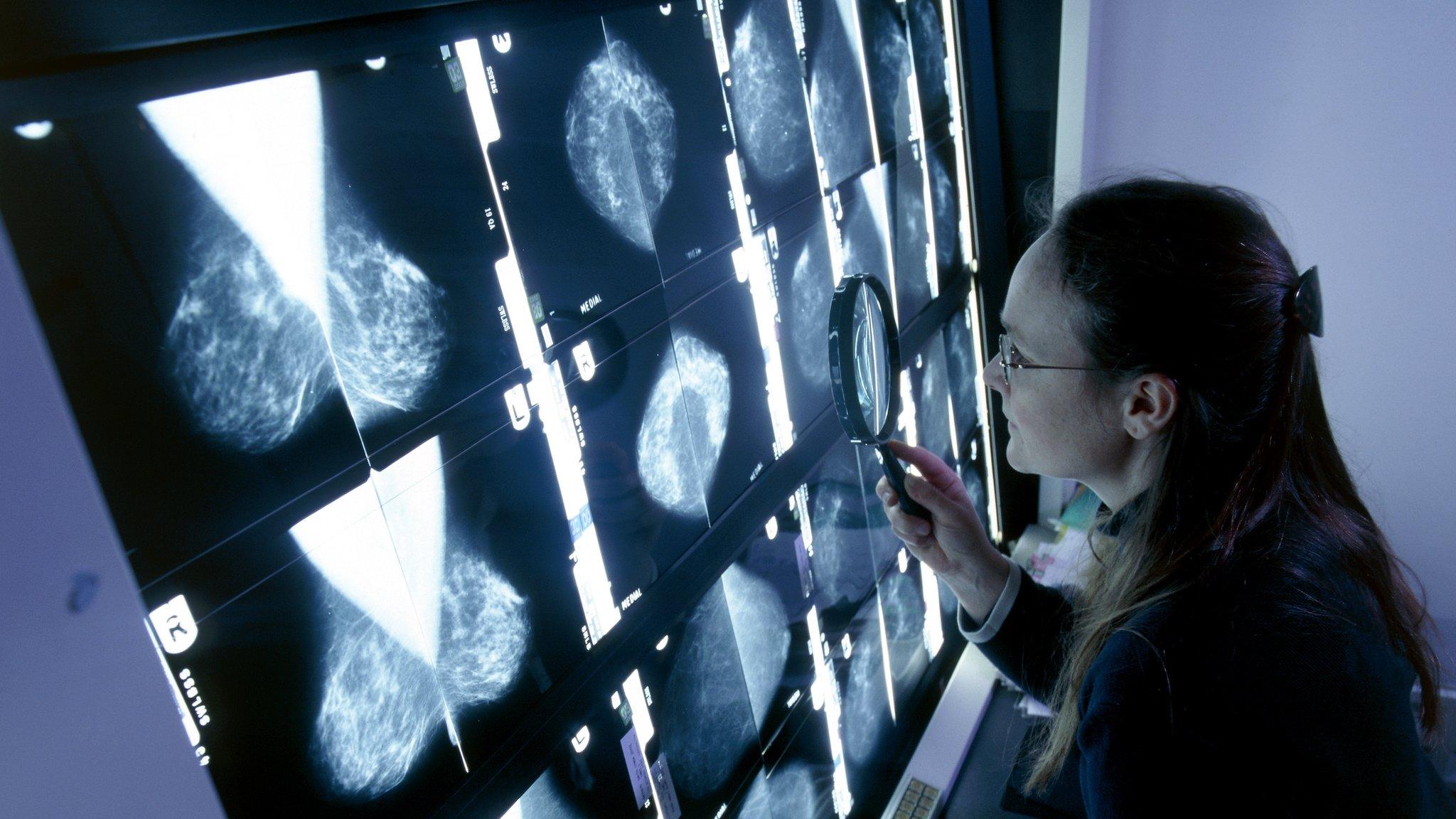Breast cancer drug stand-off "not helping patients"
- Published
- comments
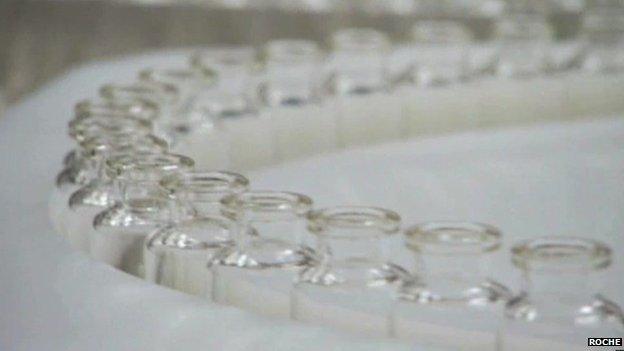
The breast cancer drug Kadcyla rolls off the production line
The decision that breast cancer drug Kadcyla wouldn't be available routinely on the NHS understandably hit the headlines on TV, radio and in the press.
It seemed to pitch drug giant Roche against the National Institute for Health and Care Excellence (NICE), the group which decides what treatments the health service can afford.
But on closer examination this stand-off seems to be the latest stage of a phoney war between officials and the pharmaceutical industry.
In the short term, hopefully very few patients will actually end up missing out on a drug which does appear to be producing some remarkable results.
But it does raise questions about the whole way cancer treatment drugs are dealt with by the NHS.
Extend life
Kadcyla is a treatment aimed at the one in five breast cancer patients who have the HER-2 positive strain of the disease.
It helps women with advanced cancer. It cannot provide a cure, but trials show it can extend life by an average of six months.
The other benefit is it offers the impact of chemotherapy without most of the debilitating side effects usually associated with that treatment.
The women taking it are able to work, and carry on a normal life. For the most part they don't experience sickness and don't lose their hair.
Instead they get precious extra quality time to live their lives.
The catch is the cost. The bill for a year's treatment is around £90,000 per patient.
At the moment NICE will only sanction treatments that cost less than £30,000-per-year.
Kadcyla's manufacturers Roche offered a small undisclosed discount, but it wasn't prepared to offer the 60% price cut needed to persuade NICE to make it routinely available to NHS patients. It said it needs to recoup the 15 years of research needed to produce the drug.
Massive difference
There's no question that has disappointed patients.
Newcastle health care worker Michelle Robson began taking it six months ago. For her it was transformative.
She told me: "After my first month, my cough was gone and I could walk without stopping. I am able to work full time, run a house, and look after my two children. It's made a massive difference.
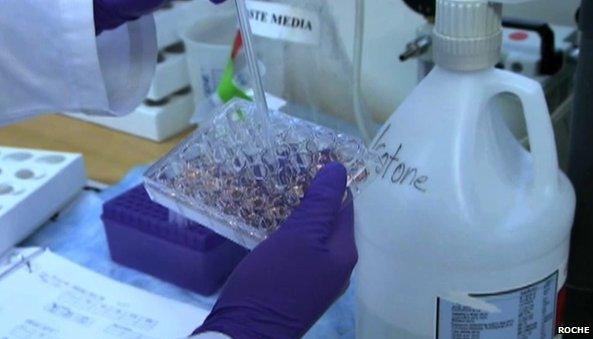
Roche says 15 years of work were needed to develop Kadcyla
"The other drugs I was on made me feel absolutely horrendous. With this one I can leave work, go get it, go back to work and live my life."
And she certainly thinks NICE has got it wrong.
She said: "It's disgraceful. These 'suits' sit behind desks and make these decisions without getting out there and asking patients and seeing the difference it makes.
"Could they really sit and say to my family, sorry we cannot afford this treatment for me."
But NICE has firmly placed the blame on Roche - a company which makes billions of pounds of profit each year.
Chief Executive Sir Andrew Dillon said: "We are really disappointed that Roche were not able to demonstrate more flexibility to help us provide a positive recommendation. The company is well aware that we could not recommend Kadcyla at the price it proposed."
Drugs fund
But actually, Michelle and many other patients in England will continue to be able to get Kadcyla.
If a doctor thinks a patient would benefit from the drug, they can apply to fund it from the separate £200m Cancer Drugs Fund.
So actually the decision may suit both sides.
NICE knew they could block the routine prescription of Kadcyla without denying it to too many patients.
And Roche knew that it would still be able to sell the drug to the NHS through the Cancer Drugs Fund at the full price.
This appears to be becoming a pattern as well.
Kadcyla is the eighth advanced breast cancer treatment that NICE has blocked for price reasons. Roche says that shows the system it oversees is "not fit for purpose" and must be reformed.
But all these treatments are still potentially available to NHS patients through the Cancer Drugs Fund.
That fund is not open-ended though. It's due to run only until 2016.
But it's difficult to believe that any politician would be prepared to withdraw it. It's provided a useful way of defusing the controversy over treatments which are blocked by NICE.
Too expensive
As long as it exists though, drug companies will know that a NICE rejection isn't the end.
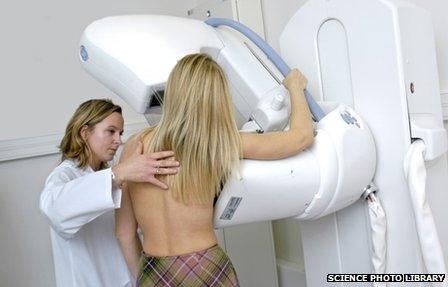
Are patients being served well by the dispute over new breast cancer drugs?
And so drugs supposedly too expensive for the NHS are still funded anyway.
Michelle Robson has been treated by consultant oncologist Dr Mark Verrill at the Freeman Hospital in Newcastle.
He has seen Kadcyla have a huge impact on patients.
But he sees the debate over its prescription as a rather futile one, and one that's not helping patients.
He said: "Before the drugs fund was established NICE was approving many of the new cancer drugs. Since it came in, they've approved hardly any.
"But the reality is most patients can still access them because of the fund.
"What this does then is open the way for NICE and Roche to play hardball with each other and have a big public bust-up about this drug, while they both still know patients can get hold of it.
"So we end up with these stand-offs instead of NICE and the pharmaceutical industry working together to get a deal.
"This is a debate that's taking place a long way from the patient. There is though a danger that drug companies see their medications not being approved, and then stop investing in technology and trials here in the UK. That could set cancer treatment back decades."
For now though Michelle Robson and others will still get the cutting-edge treatment through the NHS, and Roche will get the full payment for the prescription.
So what exists is a kind of stalemate that may not ultimately serve the best interests of patients, the pharmaceutical industry or the taxpayer. And one that nobody seems particularly happy with.
- Published8 August 2014
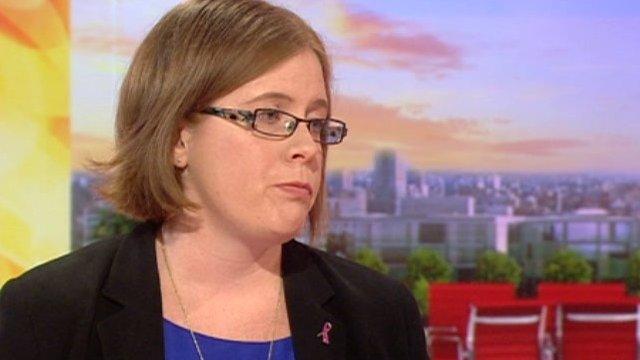
- Published8 August 2014
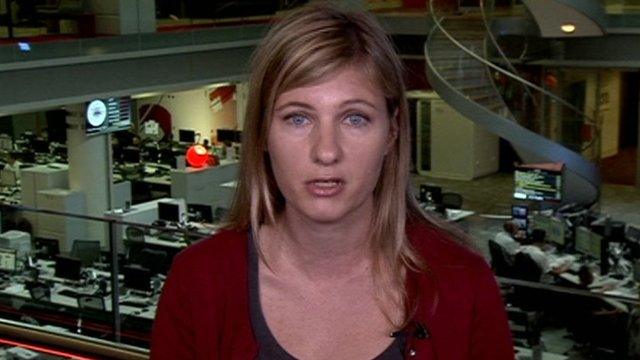
- Published8 August 2014
